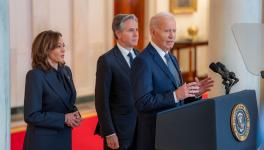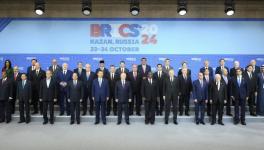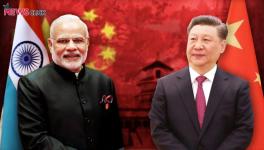US Reclaims Turkey for Western Alliance
The first components of Turkey’s S-400 air defence missiles arrived from Russia in Ankara in July, 2019. (File Photo)
Less than 48 hours separate the US President Joe Biden’s meeting with his Turkish counterpart Recep Erdogan in Brussels from his summit with Vladimir Putin at Geneva on June 16. In between comes the shadow of the North Atlantic Security Organisation (NATO) summit. This is simply exquisite, as far as planning of sequential activities go in diplomacy.
Biden’s meetings in Brussels and Geneva are, arguably, the most consequential ones, and the most significant ‘bilaterals’ he’ll be having in this entire eight-day trip to Europe. Both events have variables but their correlation is not in doubt.
Most of the issues that will figure in Biden’s meeting with Erdogan are related to Russia. Even when some US-Turkey issues do not directly concern Russia, they do affect Russia’s vital interests.
The advantage goes to Biden insofar as the personal chemistry between Erdogan and Putin is no longer what it used to be. Turkish-Russian relations are fraught with growing friction on several fronts.
On the other side, Turkey’s importance as a ‘swing state’ in the US regional strategy has increased dramatically, even as the US-Russia tensions spiked in recent months. The Biden administration’s diplomatic overture to Turkey needs to be assessed from such a perspective.
Without doubt, there are major differences in the Turkey-US relationship. Both sides have a long list of problems. But the good part is that the two sides are realistic and willing to focus on areas where partnership is possible. Both have a sense of urgency to mend their relationship.
Biden and Erdogan know each other well and their private conversation can help turn a new page in the relationship. Conceivably, they will aim for a relatively achievable relationship. In sum, manage differences and revive the partnership — that is going to be the leitmotif of the Biden-Erdogan meeting next Monday.
The differences are of three categories: political, geopolitical and personal. On the political part, the crux of the matter is that Erdogan deeply distrusts the US intentions toward Turkey. The genesis of this estrangement is to be traced to the Obama administration and Biden happens to be associated with it.
The manner in which the Obama administration coaxed Erdogan, who was a close family friend of Syrian president Bashar al-Assad, to join the US’ regime change project in Syria and subsequently disengaged itself from the project leaving Turkey in the lurch profoundly upset Ankara.
Meanwhile, the US’ policy of assisting a faction of Syrian Kurds, the YPG, began under the Obama administration, in 2014, and inevitably it has been a ticking time bomb since then.
The strategic contradiction was simply far too much for Turkey to accept — that the US got directly linked to a terrorist organisation that has long fought an insurgency against another NATO ally.
If that wasn’t bad enough, the failed coup attempt in 2016 to overthrow Erdogan dealt a body blow to the Turkish-American relationship. Turkey suspects that Obama was supportive of the coup attempt and blamed the US for harbouring the Islamist preacher Fetullah Gulen. Washington simply stonewalled when Turks sought Gulen’s extradition.
Suffice to say, Erdogan’s efforts during the past five-year period to strengthen Turkey’s strategic autonomy, to develop relations with Russia and to work toward building up Turkey as one of the great powers in the region fall in perspective.
On the geopolitical plane, a whole lot of issues have cropped up stemming out of Erdogan’s independent foreign policies in the recent years but the issue that has driven a wedge between the US and Turkey is, principally, Turkey’s purchase of Russian S-400 missile system.
Short of Turkey backing down on the S-400 missile deal with Russia, Washington and Ankara are discussing some sort of mutually acceptable formula, such as the deployment of the missile system under US control at the Incirlik air base in southern Turkey, without any Russian involvement in their operation and maintenance.
Turkey has reportedly given a written assurance to the Biden Administration that it will not activate the missile system. This could open a pathway for the lifting of the US sanctions against Turkey under CAATSA, which would revive Turkish participation in the manufacture of parts for Lockheed Martin’s F-35 stealth fighter. This could well be an outcome of the meeting in Brussels.
If the S-400 hurdle that bedevilled Turkish-American relations in the recent years can be removed, Russia will be suffering a major setback in its regional strategies all across the board — and, Putin personally risks a loss of face just before his summit with Biden, as the turnaround in Russia-Turkey relations through the past few years was Putin’s personal achievement.
No doubt, with the US backing, Turkey can be expected to revert to a role it adroitly performed in the Cold War era as the vanguard of western strategies against Russia. Even more so, for the first time in its history, the NATO can consolidate a presence in the Black Sea. Of course, with Turkish backing, Ukraine can push back at Russia with a new confidence.
Overall, it will be a game changer for the US regional diplomacy in Russia’s western and southwestern backyard. Interestingly, straight after the meeting with Biden, Erdogan, in a symbolic move, will be heading for South Caucasus to visit the territories in Nagorno Karabakh that Turkey helped Azerbaijan conquer in the recent months.
Suffice to say, the geopolitics of the regions surrounding Turkey are at an inflection point. The US has an urgent need to get Turkey on board its strategy to counter Russia in the entire region stretching from the Caucasus and the Black Sea to Ukraine and Poland. Turkey is potentially the best regional partner in the US’ efforts to contain Russia and Iran.
Most important, Turkey’s cooperation is critical to counter Russia’s growing force projection in the Mediterranean where the US has been establishing new bases lately. Turkey and the US also have a congruence of interests in keeping Russia out of Libya (which NATO visualises as the gateway for its expansion plans in Africa.)
Equally, Washington and Ankara are negotiating a deal for the deployment of Turkish troops to ensure that Kabul airport remains operational and accessible to the NATO countries even after the withdrawal of US forces from Afghanistan, which is expected next month.
Turkish Defence Minister Hulusi Akar said on Monday that Turkey is willing to undertake the mission if it receives financial, logistical, and political support from its NATO allies. This promises to be a major step in confidence building between the US and Turkey. What role Turkey can play in Central Asia to advance the US interests remains to be seen. Interestingly, just before he leaves for Brussels, Erdogan is hosting the newly elected president of Kyrgyzstan Sadyr Japarov who has a reputation for being a staunch nationalist.
Evidently, Erdogan is also under pressure internally, as his party’s popularity has dropped lately and the economy is in bad shape and the public discontent is palpable. Besides, Turkey also has lost confidence among its traditional friends and allies. Turkey’s relations with the EU are in stagnation and with Greece and France under strain.
All said, Erdogan simply cannot afford an inconclusive meeting with Biden at the present juncture. Erdogan’s strategy will be to promote Turkey as the US’ best regional partner. He has shown willingness lately to act against Russian interests. Thus, Erdogan hosted the leaders of Georgia, Poland and Ukraine — all at odds with Russia — in quick succession since April.
Erdogan has pledged full support for Georgia’s bid to join NATO, sealed a drone contract with Poland and voiced all round support for Ukraine in its standoff with Russia. Also, Turkey took active part in NATO’s Steadfast Defender exercises in Romania in end-May.
Make no mistake, Erdogan is playing for time to extend his rule for another five years after the next election, which is due in 2023. And he needs Biden’s support. Erdogan is an experienced leader, so is Biden. It should not come as surprise if the two statesmen find common ground despite the many disagreements between Washington and Ankara.
Courtesy: Indian Punchline
Get the latest reports & analysis with people's perspective on Protests, movements & deep analytical videos, discussions of the current affairs in your Telegram app. Subscribe to NewsClick's Telegram channel & get Real-Time updates on stories, as they get published on our website.
























